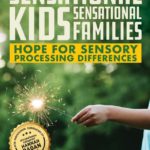If it feels like I posted this interview before, it’s because I have. It was among the lost work that resulted when my website was updated recently, and now, I’m including some bonus details.
Author and mother Rebecca Scott Duvall has launched her book, and it’s a chart-topper. Click here for more information.
Thank you for being here, Rebecca. Please tell us about your book. 
Sensational Kids, Sensational Families: Hope for Sensory Processing Differences is a candid memoir full of research, intervention strategies and positive mindset shifts that brought our family through my son’s sensory processing disorder diagnosis. Jacob was diagnosed at age 3 after being assessed in the “Some Problems” range for social participation, balance and motion, and in the “Definite Dysfunction” range on the vision, hearing, touch, body awareness, planning and ideas scales.
Now, at almost 10 years old and after years of intense intervention involving biomedical, diet, occupational therapy, brain training and more, Jacob is thriving physically, intellectually and socially! Everything that helped us is documented in this one-stop-shop style handbook to pay it forward to the next struggling individual, family, caregiver, open-minded teacher, therapist or doctor. In addition to the honest and conversational parental experiences, there are also professional question and answer sections with the occupational therapist who worked with Jacob, Hannah Ragan, MS,OTR/L.
Why did you choose to have a contributing author write sections of your memoir?
Occupational therapy was a critical component to Jacob’s treatment. His OT, Hannah, and I grew close during Jacob’s sessions … close like two soldiers on a battlefield. She was in the trenches with me most of the time, making herself available even on the weekends so I could develop a large toolbox of intervention strategies and eventually get “back to life.” When I told her I wanted to write about what we had done with Jacob, she said she had always wanted to write a book, too. I knew then it would be the perfect partnership. The raw words of a parent’s experience juxtaposed with the insights of a professional not only could I reach individuals, parents and caregivers of special needs children, but together we could reach professional audiences like teachers, therapists and doctors as well. My experience is valuable, but having her credentials coupled with it is a win-win for everyone.
When did you know you wanted to write a book?
I’ve always been a writer, but I never imagined my first published work would be about our family. No one in my circle had ever heard of sensory processing disorder, though … not family, friends or even the doctors I was partnered with at the time. As I began learning how to help my son, delving headfirst into research and intervention strategies in search of hope, I dedicated a page on Facebook to keeping family and friends informed about our SPD journey. Well, friends of family and friends started joining the page, then strangers from all over the United States and beyond found us. After repeated requests to put all my knowledge in one place to help other struggling SPD families, Sensational Kids, Sensational Families started to take root within me. I started the manuscript 2 years into Jacob’s intervention, when I began to see the light at the end of the tunnel myself, and finished it 4 years later for its release in March 2020!
What are some of the early signs that a child may have a sensory processing disorder?
From a professional’s view point, Hannah would say some common behaviors you might observe are: difficulty in social situations, abnormal sleep patterns, delays with toilet training, difficulty in coordinating how to dress themselves or clothing may appear to agitate them, a very selective diet, and delays with communication skills.
From my personal experience, I’ll get even more specific. There are two types of SPD: a seeker and an avoider. Seekers are hyposensitive to the environment, so they will run utterly wild, tear your house down, bump into things, slam doors, drop cups, squeal loudly, be constantly moving, need one of those little child leashes in public … all to fill up their “sensory buckets.” Avoiders, on the other extreme, cover their ears when toilets flush or fireworks burst, need sunglasses more often than not, hate seams in their clothing, can barely tolerate shoes, and get very anxious when routines or expectations change … all because their sensory buckets are always filled to the brim and spilling over. It is also not uncommon for any of these children (or teenagers and adults) to have a high pain tolerance, not be affected by temperature or exhibit both seeker and avoider traits! Welcome to the confusing and frustrating world of SPD. If anyone thinks that a loved one may possibly have SPD, I encourage them to talk to their healthcare provider about undergoing an evaluation.
What does your son think about your memoir?
Jacob routinely asks me if he is the star of the book. Most of the time I say no, it’s about SPD and the whole family, but sometimes I look into those twinkling eyes and say yes, you’re the star. He has been raised understanding SPD right alongside of us — learning how it affects him and how it affects others —and he is happy for our story to be told if it’ll help another family going through the same struggles while looking for the bright side.
What would you tell a writer who is considering writing a memoir?
I’d tell anyone who feels like they have a story to tell it … the good, bad and ugly. Put it out there and know that someone somewhere will appreciate knowing your journey. As far as the writing process, the best thing I did was give my finished manuscript to an editorial board of about 10 people who ranged in experience and connection to SPD — a teacher, a principal, a doctor, couple of therapists, a few SPD moms, and a few that had no idea what SPD was. It was a great way of canvassing future readers, and their critiques were priceless! The best one was a mother of an older special needs child who basically said my book made her feel like she hadn’t done enough when her son was young to make a difference. I took that comment and reworked the whole manuscript to shout “SPD can be managed and helped at ANY age!” Sensory integration is the basis for all motor control and higher cognitive thinking, so of course if you can improve sensory you can always improve your life, no matter how old. Without her critique, I may have unknowingly cut out a huge chunk of my intended audience.
Congratulations on your success in launching your book. How may readers connect with you?
I am on Facebook and LinkedIn as Rebecca Duvall Scott, and my email is rebecca@rebeccaduvallscott.com.



